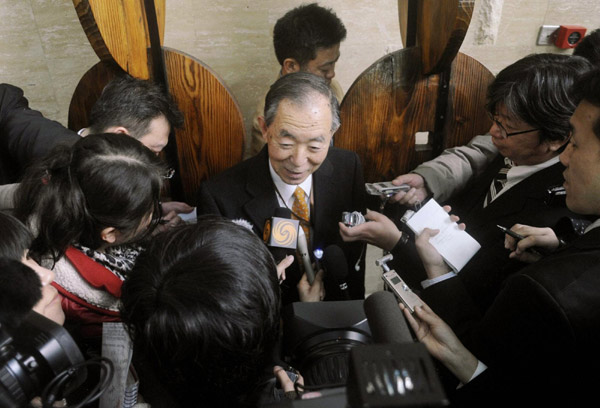Foreign and Military Affairs
Japanese ambassador in Nanjing
Updated: 2010-12-21 07:09
By Wu Jiao, Cheng Guangjin and Ma Liyao (China Daily)
BEIJING - Japan's ambassador on Monday commenced a three-day visit to Nanjing, the scene of mass killings by Japanese troops in December 1937.
 Japanese Ambassador to China Uichiro Niwa (C) speaks to reporters after arriving at a hotel in Nanjing Dec 20, 2010. [Photo/Agencies] |
Japanese Ambassador Uichiro Niwa arrived in Nanjing, capital of East China's economic hub Jiangsu province, on Monday afternoon to meet Japanese entrepreneurs and local officials in a move that analysts said will help improve strained ties between China and Japan.
It is also significant because relations between the two nations have been strained after Japanese authorities illegally detained the captain of a Chinese trawler and members of its crew in waters off China's Diaoyu Islands in September.
Upon arrival in Nanjing, Niwa said that relations between China and Japan are like a couple which cannot suffer separation.
"We have no choice but to keep friendly ties," said Niwa. "And I come to Nanjing in that spirit."
On Tuesday morning, Niwa will meet residents doing their morning exercises in the city's Xuanwu Lake Park, and deliver a lecture at a foreign language school, according to a schedule released by the Japanese embassy.
Yet the ambassador will not visit a memorial hall dedicated to the victims of the massacre, where thousands of people gathered last week to mark the 73rd anniversary of the slaughter.
Though the trip is primarily business-focused, media and analysts from China and Japan said it would improve ties.
Japan's Kyodo News reported on Monday that Niwa's visit shows that relations between the two countries "are getting better".
According to Liu Jiangyong, an expert on East Asia studies with Tsinghua University, Niwa avoided visiting the memorial hall because he did not want to provoke the Japanese right-wing.
"Niwa has limited political influence. Yet by focusing on trade and the economy, Niwa is doing what he specializes in, and doing his part in reviving bilateral ties," said Liu.
The eastern province has more than 7,000 firms that have Japanese investment.
In a coincidental development related to the Diaoyu Islands, the ancient manuscript of Haiguoji, or literally "records of maritime kingdoms", which offers further historical proof that the islands belong to China, went under the hammer on Monday in Beijing.
An unidentified Chinese buyer submitted the winning bid of 13.25 million yuan ($1.98 million) in an auction organized by Beijing CNTC International Auction Company Limited.
With a reserve of 8 million yuan, the 160-page manuscript, hand-written during the Qing Dynasty (1644-1911), was discovered in 2005 by a private collector in Nanjing.
It records what the scholar Shen Fu saw and heard during his trip to Liuqiu Kingdom, a vassal country to China at that time, which is today's Ryukyu Islands.
Shen said that he saw an island that "looks like a brush pen rack" named "Diaoyutai" before leaving for Liuqiu Kingdom. The description was confirmed as proof by experts that the Diaoyu Islands have belonged to China at least from 1808 when Shen's words were written.
The auction organizers said that non-Chinese nationals would not be allowed to bid as "it concerns territorial sovereignty", according to 40-year-old Peng Ling who found the manuscript in Nanjing five years ago.
Peng said after part of the manuscript was made public, a number of foreigners contacted him either questioning its authenticity or offering to buy it, but he refused all offers.
"It is proof that the Diaoyu Islands and its adjacent islands are Chinese territories since ancient times, and China is the best place for the book to stay," Peng told China Daily after the auction.
"All claims by the Japanese on the Diaoyu Islands will prove to be lies in the face of the historical manuscript," Peng said, and suggested that the part that mentions the islands should be compiled into school textbooks.
Cai Genxiang, an expert from Taiwan Normal University said the manuscript is of historical significance with its full and accurate description of local conditions and customs.
Liu Jiangyong, an expert on East Asia studies with Tsinghua University, said the manuscript is actually only one part of the evidence that historians have compiled.
"The sovereignty of the Diaoyu Islands is an historical fact, and I believe other evidence will continue to come out in the future," Liu said.
E-paper

Ear We Go
China and the world set to embrace the merciful, peaceful year of rabbit
Preview of the coming issue
Carrefour finds the going tough in China
Maid to Order
Specials

Mysteries written in blood
Historical records and Caucasian features of locals suggest link with Roman Empire.

Winning Charm
Coastal Yantai banks on little things that matter to grow

New rules to hit property market
The State Council launched a new round of measures to rein in property prices.




